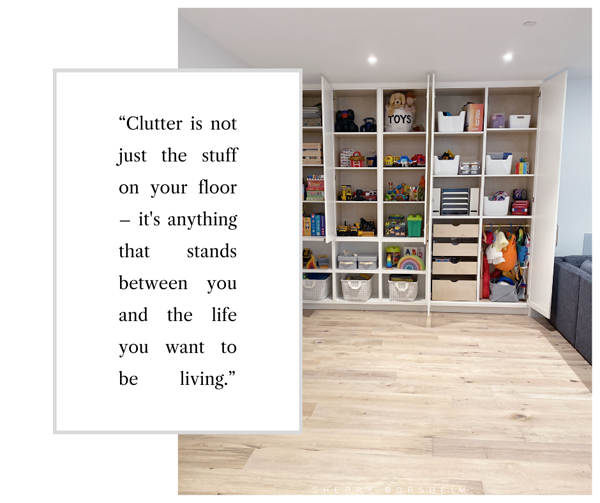
Untidy environments increase stress for most people. Do you declutter your mind while you declutter your home? Science says yes.
We all know the feeling after accomplishing that thing we’ve been putting off, and oftentimes that thing is tidying up. But where does that feeling come from, and how can we get more of it?
Is this you?
People who have a hard time to declutter your home often struggle with:
- Time management and project motivation
- Feeling overwhelmed easily, which can lead to procrastination
- Perfectionism and finishing tasks
- Holding attention and being distracted frequently
- Saying “no” to others
Orderly environments are linked to more healthy choices.
Our surroundings shape our thinking. If you’re constantly looking at all the things you’re putting off, it’s going to reflect poorly on your mental health. It's more enticing to prepare healthy meals in an orderly kitchen with an easily accessible pantry, and most people sleep better in a tidy room with a made bed.
Pro Tip: Split your fridge, freezer, and pantry into sections that make sense to you, and put items back after use every time.
Improve focus.
Disarray makes it harder to find what you need and makes you more prone to frustration. It may also distract you while doing another task. Declutter your home by sorting through visual clutter can help your focus and attention span.
Pro Tip: Start with your most frequently used spaces. Clear off your kitchen and bathroom counters. Find a place for each item.
Alleviate depression and anxiety.
The only thing a messy home can add to your life is more burden to your mind. Clutter will make you feel worse and scatterbrained, and it is more challenging to want to clear up the space when you see piles accumulating. You may not feel like doing it, but any small steps you can take will improve your overall mood.
Pro Tip: Ask for support while organizing. Having someone around can make the task less dull and more fun.
Reduce dust and allergies.
You may think that your home is clean despite being disorganized. But you would be surprised at how much dust, pet debris, and mold can build up when hidden. It's important to regularly declutter your home, otherwise, it's harder to clean around piles of belongings.
Pro Tip: Give yourself 20 minutes a day to tidy up any piles laying around the house.
Enhance self-esteem.
Cluttered spaces erode your confidence because it causes you to feel less in control of your life. Feeling proud and at ease in your home gives you an automatic confidence boost. A living environment that looks more respectable can be extremely empowering.Pro Tip: Find inspirational pictures and try to imitate them in your home.
Better relationships.
It’s a drain on your energy and for others in the home to keep clutter lying around. When a household can delegate organizational tasks to everyone, it creates a sense of teamwork and strengthens bonds. Plus, it gets everybody motivated when you can declutter your home together.
Pro Tip: Consider a “Homeless Things” basket for any items you find scattered around the house. Set a ritual once a week where each person checks the container to remove the items that belong to them.
Free up time and energy.
When you’re chasing mess after mess it’s impossible to mentally relax. There’s a reason insomnia is linked to disorganization and the accumulation of too many things. Having fewer things means making fewer choices throughout the day.
Pro Tip: Keeping a schedule for tidying up; maintaining a system is easier than creating a new one each time. Try to donate or sell items that you no longer need.
Decluttering can actually be quite therapeutic; play some relaxing music, visualize your desired “after” of the space, sort in a system that works for you, and simply enjoy the zen that comes with a tidied home.
Which room will YOU start in? Comment below!
Like this article?
You’ll love this one
10 Day Decluttering Challenge

Don’t know where to start decluttering?
Sign up for my free newsletter so I can send you the best organizing tips and strategies each week.
(and some freebies, too!)

This was so helpful! Thanks for sharing.
So glad you enjoyed this blog post!